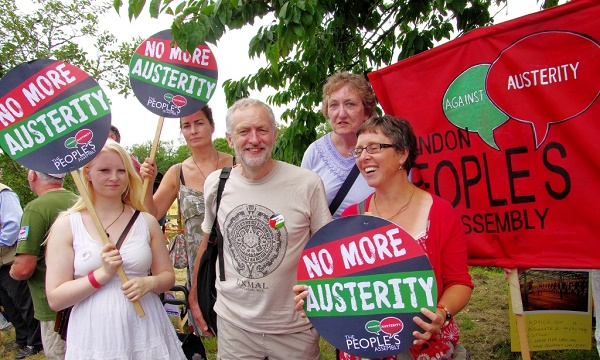Jeremy Corbyn’s ‘new politics’: entryism or ‘folk politics’ coming of age?
Jeremy Corbyn’s politics might not signal the end of Labour as an electable party but a much deeper change in British politics. James A. Smith explains that the Left has long focussed on protest politics, but led by Corbyn, the causes that the Left stands for now have the potential to gain the backing of various institutions. And although Corbyn does not have such support yet, recent developments indicate that he soon might.

Credit: Haydn CC BY-NC-SA
Things are going well for Jeremy Corbyn… right? Well, there’s the matter of the poor polling of both the Labour Party and of Corbyn personally, and the fact that Corbyn does not command enough support within his party to effectively fill all shadow cabinet positions. And yes, under his leadership, the Labour Party is in a state of disrepair unprecedented for a British opposition in modern times, even as the Tories have responded to their own crisis with characteristic ruthlessness, and put power ahead of faction. Yet within the Labour Party, one thing after another is going Corbyn’s way. Collectively, these imply a sea change in the party institutionally.
A court action against the NEC’s decision that Corbyn must automatically be included on the ballot in the current leadership contest has failed. This was followed by an initially successful one by Corbyn’s own supporters against measures that would exclude new (presumed to be Corbynite) members voting. While this appeal has itself now been defeated, the unedifying spectacle of a Labour establishment reduced to squabbling for payment of legal fees from its own members can only have strengthened Corbyn’s hand among many of those that are still permitted to vote.
Corbyn’s shadow cabinet is now more diverse, more Left wing, and generally more congenial to his project than it was before. Even the leadership challenge seems to have improved Corbyn’s standing institutionally: journalists formerly critical of his leadership’s notoriously awful media strategy now report improvements within his team.
Within the party structure itself, the elections to the NEC have swept pro-Corbyn candidates to every seat in the elected CLP section. And, more pressingly, standing Tory plans to reduce the number of MPs via a boundary review, due to be implemented in 2018, mean that the reselection of existing MPs (and so, potentially, the replacement of the more intransigent among them by pro-Corbyn Leftists) is now less an insidious “Trotskyist” threat than a simple administrative inevitability.
No one should take lightly the prospect of committed centrist MPs with politics perfectly in keeping with Labour’s broad traditions being removed from their candidature. But as one anti-Corbyn commentator has recently conceded, the “party is in a fight to the death… There is no longer any hiding places”. Either Corybn goes – and it doesn’t look like he’s going anywhere – or the changing identity of the party is going to have to be reflected in the PLP.
It is common for Corbyn’s critics to represent him as an exponent of a “politics of protest”, more interested in demonstrations over single issues than in participating in the adult rigours of actual power. In their enthusiasm, it is alleged, Corbyn’s supporters are toppling a historically great party of government into a vaguely defined “social movement”, all chants and banners, leaving a free hand to the more institutionally savvy Tories.
But what if the reverse is happening? Political writers of the radical Left such as Jodi Dean in the US, and Nick Srnicek and Alex Williams in the UK, have been arguing that if it is to return to meaningful influence on how politics is to be shaped, the Left must end its love affair with the “folk politics” of Stop the War, Occupy, and student demonstrations. To greater or lesser extents, these authors acknowledge the important contribution such movements make to progressive causes. But without meaningful institutional formations such as think tanks, media operations, and a party itself, they contend that the Left will remain stuck in a politics that goes no further than a kind of feel-good hobby or academic abstraction.
What if, then –far from being the expression of retrograde protest politics of popular legend – Corbynism represents the institutional coming of age of the remarkable “folk politics” of recent decades, from Stop the War, to Occupy, to Black Lives Matter? The moment, as Dean might put it, when impressive but politically limited “crowd” ossifies as hegemony-influencing “party”?
Corbyn’s recent internal victories within the Labour Party suggest it may be so. This is not “entryism”, then. Such academic analysis of Corbyn’s supporters as exists suggests that the Labour membership – always to the Left to the PLP – was longing for their personal politics to receive such institutional manifestation well before Corbyn appeared on the ballot paper. In this regard, something like the programme argued for by Dean, and Srnicek and Williams, has been waiting to happen in Britain for some time.
—
This article represents the views of the author and not the position of the Democratic Audit blog, or of the LSE. It was first published on LSE British Politics and Policy.
—
James A. Smith teaches at Royal Holloway, University of London. He is the author of a book on tragedy. His next book, Other People’s Politics is forthcoming from Zero Books.





 Democratic Audit's core funding is provided by the Joseph Rowntree Charitable Trust. Additional funding is provided by the London School of Economics.
Democratic Audit's core funding is provided by the Joseph Rowntree Charitable Trust. Additional funding is provided by the London School of Economics.
Jeremy Corbyn’s ‘new politics’: entryism or ‘folk politics’ coming of age? https://t.co/X0mss695ep
Jeremy Corbyn’s ‘new politics’: entryism or ‘folk politics’ coming of age? https://t.co/RWqkoPrjt2
Jeremy Corbyn’s ‘new politics’: entryism or ‘folk politics’ coming of age? https://t.co/UVSMXVFHbn
Jeremy Corbyn’s ‘new politics’: entryism or ‘folk politics’ coming of age? https://t.co/jyOQqJ9iAe https://t.co/dCvJFhc6g0